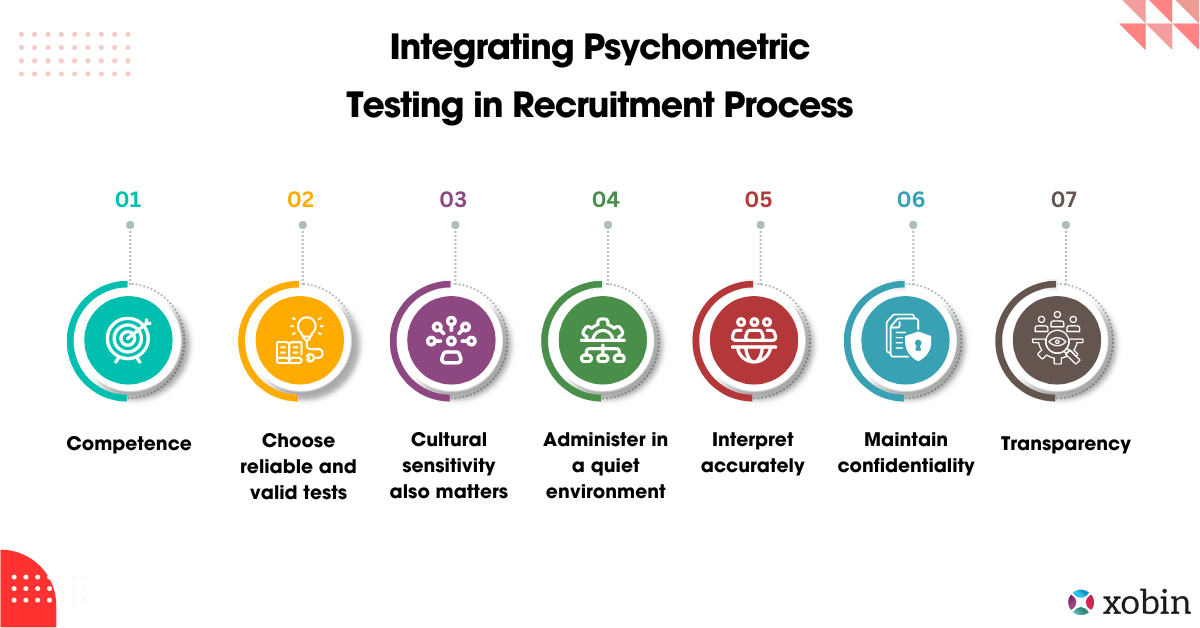Organizations conduct psychometric assessment to measure a candidate’s mental capabilities, intelligence levels, aptitude, traits, and other skills to analyze their long-term potential beyond what is stated in their curriculum vitae (CV). Employers can gain a more holistic evaluation and secure the best talent for the vacant role by assessing personality, behaviors, and cognitive ability. It serves as a litmus test to gauge a candidate’s potential and future performance. Additionally, it indicates if the candidate is genuinely interested and invested in the long haul. This blog will discuss why psychometric testing in hiring is a valuable investment for companies and the best practices for integrating it into the hiring process.
Table of Contents
Why Should Companies Invest in Psychometric Testing?

Psychometric testing benefits the pre-hiring process by identifying the best candidates. However, its advantages also extend to management and existing employees as well.
For example, a company is searching for a candidate with a specific trait or attribute to fill in a spot to complement an efficient team. A psychometric test can determine what the organization lacks and identify the candidates who embody those attributes alongside their qualifications.
Aside from pre-hiring benefits, here are additional advantages of psychometric testing in hiring process that companies can leverage:
Reduce hiring bias
A psychometric test focuses on a candidate’s potential, avoiding reliance on intuition, gut feelings, or subjective impressions. The standardized test ensures that all candidates are evaluated using the same criteria and conditions.
Provide added value for candidates
HR practitioners customize personality questionnaires and aptitude tests to focus on the specific skills and abilities they are hiring for. It also makes candidates reflect and consider their thinking attitudes. Discussing the tests with them can improve self-awareness.
Cost-effective and saves time
Since a psychometric test can predict how a candidate will fare in a role, companies can prevent non-performance and high turnover rates, which may incur losses. The tests can also save time and money, as they can be conducted on laptops, tablets, desktops, and mobile phones. Automating psychometric tests can also expedite the recruitment process.
Bolster hiring process
Face-to-face interviews whether structured or unstructured can help form an impression and see how candidates communicate and think on their toes. However, they may not perform well due to nerves. They could perform terribly but possess the skills needed for the job.
Likewise, a candidate who gives a great interview may not thrive in the role. So, HR practitioners use psychometric testing to complement their process and not rely on the interview alone.
Identify potential leadership
A psychometric test can also be tailored into a leadership assessment to determine a candidate’s progression into higher positions. This would help companies support better succession planning and maximize employee engagement ambition.
Integrating Psychometric Testing in Hiring Process

Implementing psychometric assessment is an invaluable tool for personal growth and development. Organizations must use them responsibly to maximize results. These recommended practices allow managers to make decisions, reduce turnover, and assemble a more efficient team.
Competence
Training and certification are essential to obtain reliable and accurate results. This improvement enhances the overall quality and assessment process. Moreover, organizations should regularly revise their assessment practices. By integrating the latest research findings, they can ensure their methods remain up-to-date and effective. HR practitioners must be well-versed in the newest research findings and best practices. They can upskill further by enrolling in 2024 online PsyD programs. It guarantees companies are up-to-date and achieve objectives.
Choose reliable and valid tests
A registered psychologist who is accredited, trained, and skilled must validate the reliability of psychometric assessments. Consider the company’s goals and choose assessments that measure factors directly related to the role.
Cultural sensitivity also matters
Psychometric tests must be accessible and understandable to all candidates irrespective of their cultural and linguistic background. Aside from creating a good impression on the candidates, cultural adaptation ensures fairness without biases that could put them at an advantage or disadvantage.
Administer in a quiet environment
A quiet environment will help managers administer psychometric tests more effectively. Inform candidates they must limit distractions and provide sufficient time limits to ensure standardized conditions.
Remind candidates to answer personality tests as honestly as possible. There is no point in concealing your personality, as companies will check the reliability and coherence of your answers. Also, some tend to give “socially acceptable” answers, which do not reflect reality and contradict one another. This will be detrimental and will affect their application.
Interpret accurately
Assessments reveal a candidate’s abilities, personality, traits, and cognitive functions. Interpreting these results is crucial to get insights. Some tests may be too objective and rely on scores. So, analyze the data, identify patterns and trends, and consult an expert to back your results.
Maintain confidentiality
Share scores only with the person evaluated or those authorized to view them. Avoid using the data in isolation; it should not serve as a means to unfairly label, stereotype, or discriminate against others.
Transparency
When maintaining confidentiality, candidates must also be informed about the purpose of the tests and how the results will be used. When the candidate does not qualify, use the psychometric assessment as feedback to help them land for other roles. As they say, rejection is far better and more humane than silence.
Conclusion
Companies need to leverage the objectivity of psychometric testing for hiring. The tests benefit individuals by helping them understand themselves better while companies learn to improve hiring decisions. With a human-centric approach, managers deepen their understanding of candidates, making employee engagement more productive.






